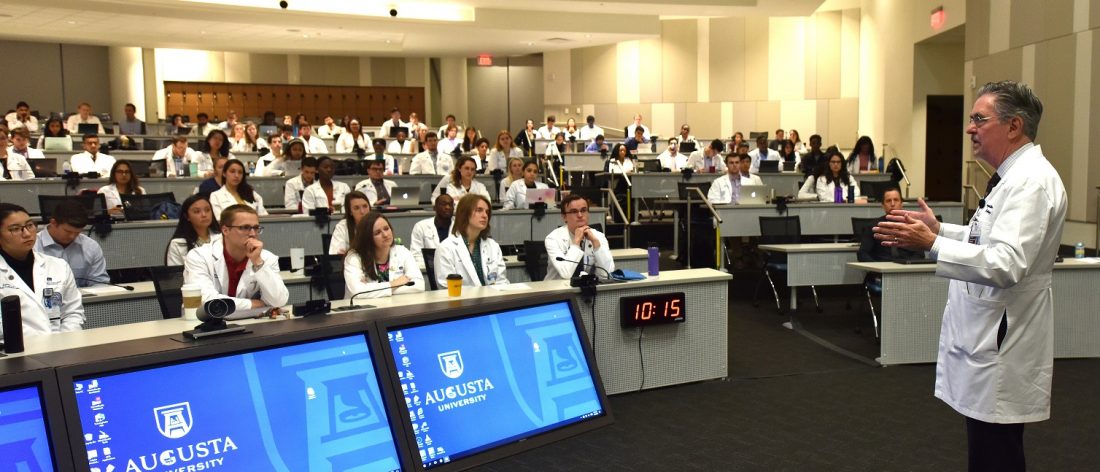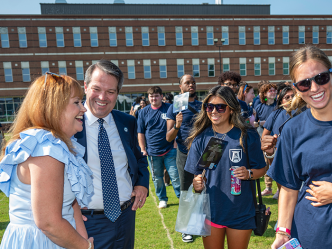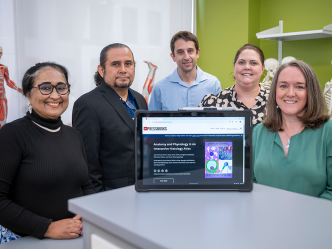The Medical College of Georgia at Augusta University is helping lead the statewide response to the COVID-19 pandemic with the creation of a pandemic medicine course that will mobilize the medical school’s statewide faculty and see up to 400 third- and fourth-year MCG students fan out to support public health departments and hospital systems across Georgia.
“As the state’s public medical school, MCG should lead the way in assisting with the statewide response to COVID-19,” says MCG Dean, Dr. David Hess. “Our extensive, more than decade-old regional campus network, more than 2,500 volunteer faculty, multiple hospital partnerships and students already learning in every corner of our state all naturally position the medical school to take the lead in helping address this statewide public health crisis. MCG’s vast educational network will be indispensable to the state during this pandemic.”
The interactive elective designed by both MCG and AU administrators, as well as the state’s public health district directors, would see students working in the field, on phone banks in public health call centers for example; performing epidemiological tracking of coronavirus cases; and supporting drive-through testing centers – all where they are needed most. Students will receive online pandemic medicine training before going into the field.
The medical school’s academic leadership will work with partners through MCG’s statewide educational network – with campuses based in Augusta, Athens, Albany, Rome, Savannah and Brunswick – to deploy students to every public health district in Georgia. Students’ locations across the state will be mapped in real time and in correlation to where coronavirus outbreaks pop up, making sure students are sent where the state needs them, and their public health skills, most, says Dr. D. Douglas Miller, MCG vice dean for academic affairs.
“Our students are Georgians – 95% of each class comes from our state,” Miller says. “They are training to become physicians and some of them are only months away from being MDs. They all are personally and deeply committed to being part of their state’s response to this pandemic.”
“When we started our medical school careers, we swore an oath dedicating ourselves to be pillars of our communities and to always place the needs of the patients and community at large above all else,” adds third-year MCG class president Susan Brands. “Recent events have created a need beyond anything we have experienced so far in our professional careers. I am grateful to be at a school where our administration has enough trust in their students to involve us through this pandemic medicine course, as well as an administration that is prioritizing the needs of our communities statewide.”
Clinical rotations for third- and fourth-year medical students are temporarily suspended during the coronavirus outbreak, so they have more time in their schedules for public health work and to help relieve an already overtaxed health system. Miller explains, “Students are trained to communicate between experts and the public. They could help relieve some of the stress on the physician and advanced practice provider workforce that is and will continue to be overly taxed during the COVID–19 pandemic.”
MCG students are no strangers to disaster medicine training – second-year students participate in a disaster training day and take a day-trip to the Centers for Disease Control and Prevention annually. The Southeast Campus, based in Savannah and Brunswick, has also received national recognition for its creation of the first student unit of the Medical Association of Georgia’s Medical Reserve Corps.
The Augusta University and the AU Health System have been working to address the COVID-19 pandemic through the development of an app that provides virtual screenings for the virus 24/7 and by working to develop a test for coronavirus, based on modified testing recommendations from the CDC, which can be run on campus and will shorten wait times for test results.
Those efforts are proving effective for Augusta and the surrounding areas, and this new elective will help expand the university and state’s public medical school’s support of the state’s health care system.
 Augusta University
Augusta University




